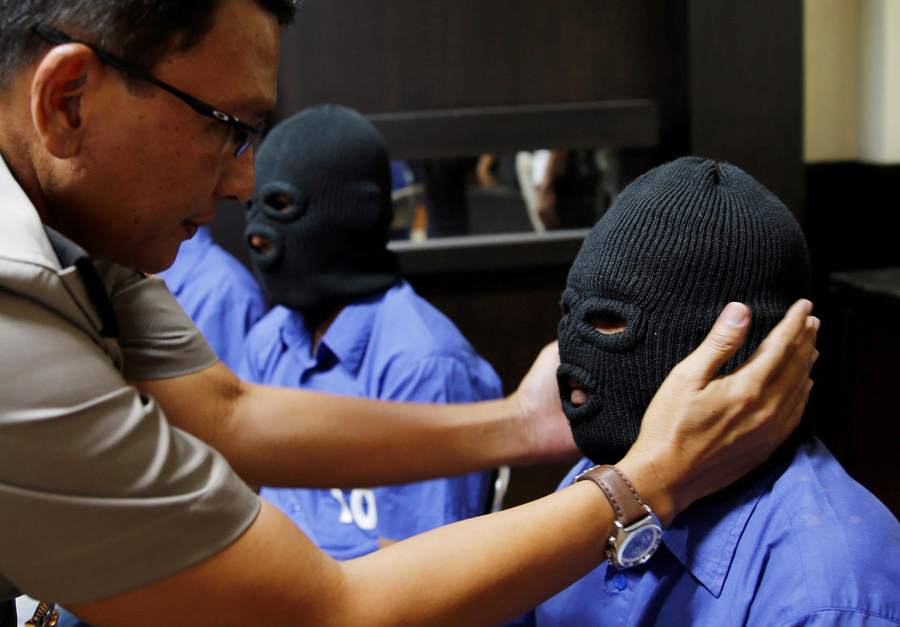
An Indonesian police officer adjusts the head cover of a suspected drug smuggler before he and others are displayed to reporters at the National Narcotics Agency office in Jakarta, Indonesia: photo by Beawiharta / Reuters, 27 July 2016
Jakarta, Indonesia -- A prison guarded by crocodiles, tigers and piranhas.
Force-feeding drug dealers their own narcotics until they die.
Controversial as they may be, these are just some of the latest weapons Indonesia is considering in its war on drugs.
With the country home to 4.5 million addicts, according to government
estimates, Indonesia's National Narcotics Agency is suggesting these
proposals to tackle the drug menace.
The government says 33 people die from overdoses each day, and it considers the narcotics problem a national emergency.
"We need to be serious because drugs are the enemy," says agency spokesman Slamet Pribadi.
Indonesia already has tough narcotics laws, including death by firing
squad for large-scale traffickers. But the government believes more
needs to be done to deter local drug use.
Across Indonesia, police have stepped up raids on suspected drug
dens. A recent raid in Jakarta resulted in four deaths -- a police
officer, an informer who provided intelligence, and two gang members.
"We have to fight this war on drugs everywhere," says Hendro Pandowo,
the local police chief who oversaw the raid. "They have to be cleaned
off the streets of Jakarta and eradicated throughout Indonesia."
Every week, law enforcement agencies gather the media and parade the
low-level drug users, dealers and the narcotics they have snared. [...]
Inside the Indonesian prison using Scientology
Al Jazeera was granted rare access to Cipinang, the country's biggest
jail, which has a special section to accommodate the growing number of
drug criminals.
Chief Warden Andika Prasetya admits that drug offenders struggle to get support in his overcrowded prison.
"We're only capable of holding 1,084 prisoners. But today, we have
2,933 inmates. It causes many problems. There's not enough clean water
for them. There's little room for resting or rehab activities."
About 1,000 prisoners are attending rehab classes in the jail's
treatment programme, which is based on the teachings of L Ron Hubbard
and the Church of Scientology.
The chief warden is convinced the programme works.
"When we use this method, we notice changes in their behaviour," he
says. "They're happy, more obedient and disciplined. They look cleaner
and tidier compared to others who haven't done the programme." [...]

Drug dealers are taken away by Indonesian authorities: photo by Dessi Ariyanti/Al Jazeera, 28 February 2016

This Jakarta shooting gallery is affectionately known as 'heroin heaven' and is a popular place for shooting up: photo by Drew Ambrose/Al Jazeera, 28 February 2016
Rowing toward 'Execution Island'
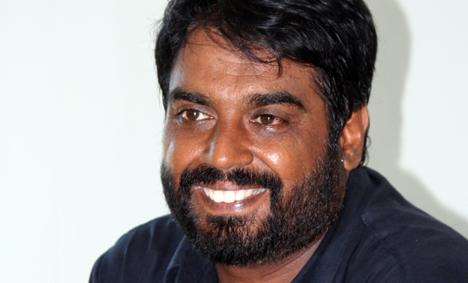
Zulfiqar Ali, a Pakistani textile worker in his 50s, arrested on drugs possession charges in 2004 at his home in West Java, later severely beaten during 'interrogation', now awaiting imminent execution by firing squad on Indonesia's infamous 'execution island': photo via Amnesty International, 30 July 2016
Stop the executions in Indonesia: Amnesty International UK, 30 July 2016
10 people are at imminent risk of execution in Indonesia, as four prisoners were killed by firing squad on 28 July. The group of 14 were this week served execution notices on ‘execution island’. All of the prisoners have been charged with drug-related crimes after unfair trials, and some of them have active appeals for clemency pending.
The death penalty is not the way to tackle drugs crime in Indonesia. President Widodo can still step in and stop the remaining executions. Call on him to do so immediately.
10 people are at imminent risk of execution in Indonesia, as four prisoners were killed by firing squad on 28 July. The group of 14 were this week served execution notices on ‘execution island’. All of the prisoners have been charged with drug-related crimes after unfair trials, and some of them have active appeals for clemency pending.
The death penalty is not the way to tackle drugs crime in Indonesia. President Widodo can still step in and stop the remaining executions. Call on him to do so immediately.
A further ten prisoners remain in immediate danger of execution. Please keep calling on Indonesian authorities to step in and let them live.
Zulfiqar Ali (pictured above), a Pakistani textile worker in his 50s, was arrested on drugs possession charges in 2004 at his home in West Java. He wasn’t allowed to contact the Pakistani embassy and was denied access to a lawyer until a month into his detention. When he was interrogated by police, Zulfiqar was kept in a house for three days and punched, kicked and told he’d be killed unless he signed a ‘confession’ -- which he later did. The injuries caused by police later required Zulfiqar to have stomach and liver surgery; the ‘confession’ he’d signed after being beaten was not questioned in court -- where his trial was conducted in a language he couldn't understand. He has been taken to the prison on Nusakambangan Island, Central Java, ready to be executed.
Indonesian Merri Utami has an application for clemency pending. She was arrested for heroin possession in 2001. Merri says when she was arrested police officers repeatedly beat her, sexually harassed her and threatened her with rape to make her 'confess' to heroin possession. Her sight has been damaged as a consequence of the beatings. She was convicted and sentenced to death in 2002.
In total, ten prisoners in Batu prison on Nusakambangan Island, known as ‘execution island’, now await imminent execution by firing squad.
Among the group are three Indonesian prisoners and seven foreign nationals –- from Nigeria, Pakistan, India, Zimbabwe, Senegal and South Africa. All of them are facing execution for drug-related crimes. Many of them have live appeals for clemency with the authorities.
None of them should be going through this horrific process, and none of them should be denied their right to life by the Indonesian authorities. The death penalty is the ultimate denial of human rights, and we oppose it in every case.
The last couple of prisoners from the group were moved to Nusakambangan Island -- 'execution island' -- on 24 and 25 July. Their lawyer was notified that execution was imminent. Meanwhile, other prisoners who were already being kept on the island were stopped from seeing their families this week -- usually a sign that execution is looming.
On the morning of 28 July, relatives of the group of 14 were told that their loved ones would be executed that evening. Indonesian law and international standards requires relatives to be given 72 hours' notice before an execution.
That night, four prisoners were shot by firing squad: Fredi Budiman, Humphrey Jefferson Ejike, Michael Titus Igweh, and Seck Osmane.
This is all a dramatic and flawed attempt by Joko Widodo to curb drugs crime in Indonesia. In March 2013, the country resumed executions specifically for drugs-related crimes after four years of not executing. The president has said that execution is an ‘important shock therapy’ for anyone who commits drugs-related crimes.
But the death penalty is not the solution to drug-related crimes.
Many of the prisoners facing executions were denied fair trials, say they were coerced into making ‘confessions’, have been severely mistreated in detention -- and have been served an irreversible and extremely harsh punishment for ‘non-serious’ crimes.
President Joko Widodo could still step in and stop the executions. He could grant the appeals for clemency, and respect the prisoners’ right to be free from torture, as well as their right to life. Ask him to do so today.
Call on the president to stop the remaining executions.

Boncos slum is one of the poorest parts of downtown Jakarta. Heroin is widely used here despite the drug crackdown: photo by Drew Ambrose/Al Jazeera, 28 February 2016
The Philippines: No Mercy
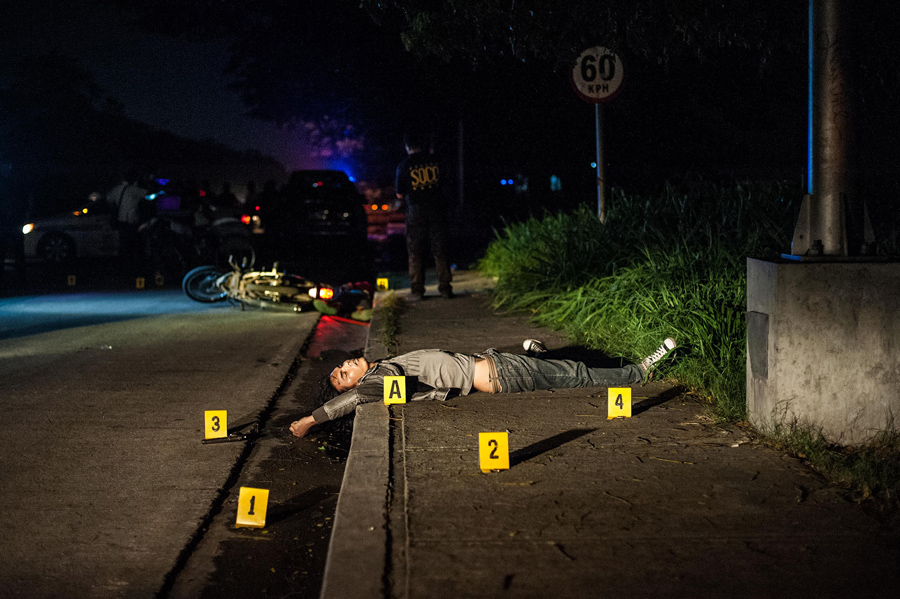
Police examine a crime scene where an alleged drug dealer was killed in an alleged shootout with police on July 22, 2016 in Manila, Philippines. Philippine President Rodrigo Duterte declared a war on crime and drugs after winning the presidential elections on May 9, 2016. President Duterte has recently been living up to his nickname, 'The Punisher', as Philippine police have been conducting night time drug raids on almost a daily basis. With reports of at least 300 drug related deaths since the start of July, Human rights groups and the Catholic church have objected to the use of brutal force by the Police.: photo by Dondi Tawatao, 22 July 2016
MANILA (AFP) – Philippine President Rodrigo Duterte vowed Monday
(July 25) to show “no mercy” in his bloody war on crime, warning
criminals that priests and human rights advocates cannot protect them
from being killed.
A defiant Duterte devoted a large chunk of his inaugural “State of
the Nation” address to his law and order campaign, which has claimed
hundreds of lives since he took office on June 30.
“Show no mercy to them because they are not showing any mercy to us
anyway,” Duterte told lawmakers as he summarised his orders to security
forces to eliminate alleged drug lords.
Duterte, 71, won the May election in a landslide after promising
quickly to eradicate crime by unleashing security forces with
shoot-to-kill orders, and vowing that tens of thousands of people would
die.
Police have reported killing more than 200 drug suspects, or an
average of 11 per day, since he assumed office. Police have insisted
they have only killed people in self-defence.
Media tallies have put the death toll far higher, taking into account
the many bullet-riddled or stabbed corpses that have been found on
streets across the nation.
ABS-CBN television has recorded 544 deaths since election day.
On Monday Duterte declared there would be no let-up in the campaign,
ordering police and local officials to “double your efforts, triple them
if need be”.
“We will not stop until the last drug lord, the last financier and
the last pusher have surrendered or put behind bars or below the ground
if they so wish,” he said to loud cheers.
Duterte’s message has proved wildly popular with many Filipinos. He
scored an unprecedented trust rating of 91 per cent in a survey by
independent pollster Pulse Asia this month.
Church groups, rights advocates and some sections of the media have
criticised the war on crime and expressed alarm at what they have termed
extrajudicial killings.
A major newspaper carried a front-page photo on Sunday of a weeping
woman holding the body of a man who had been shot dead on a Manila
street by unidentified gunmen on a motorbike.
“You are portrayed in a broadsheet like Mother Mary cradling the dead
cadaver of Jesus Christ. Let’s do drama here,” Duterte said in his
speech in response to outrage by some over the photo.
“If you don’t want to die, if you don’t want to get hurt, don’t rely
on priests and human rights (advocates). That won’t stop death.”
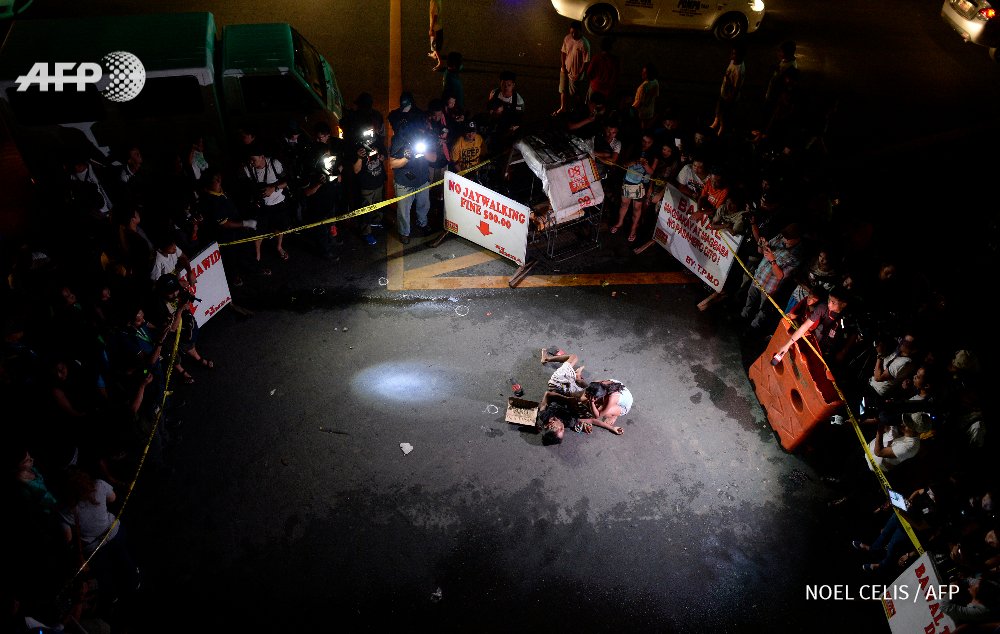
PHILIPPINES- A woman mourns loss of her husband next to a
placard which reads "I'm a pusher" in Manila. By @herime23: image via
Frédérique Geffard @fgeffardAFP, 23 July 2016
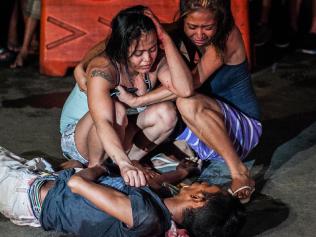
Horror pics show results of Pres #Duterte's murderous crackdown on drug crime @newscomauHQ: image via Marnie O'Neill Verified account @marnieoneill7, 27 July 2016
The Iron Fist of 'The Punisher'

Philippine President Rodrigo Duterte: photo by Dondi Tawatao, 27 July 2016

Philippine President Rodrigo Duterte: photo by Dondi Tawatao, 27 July 2016
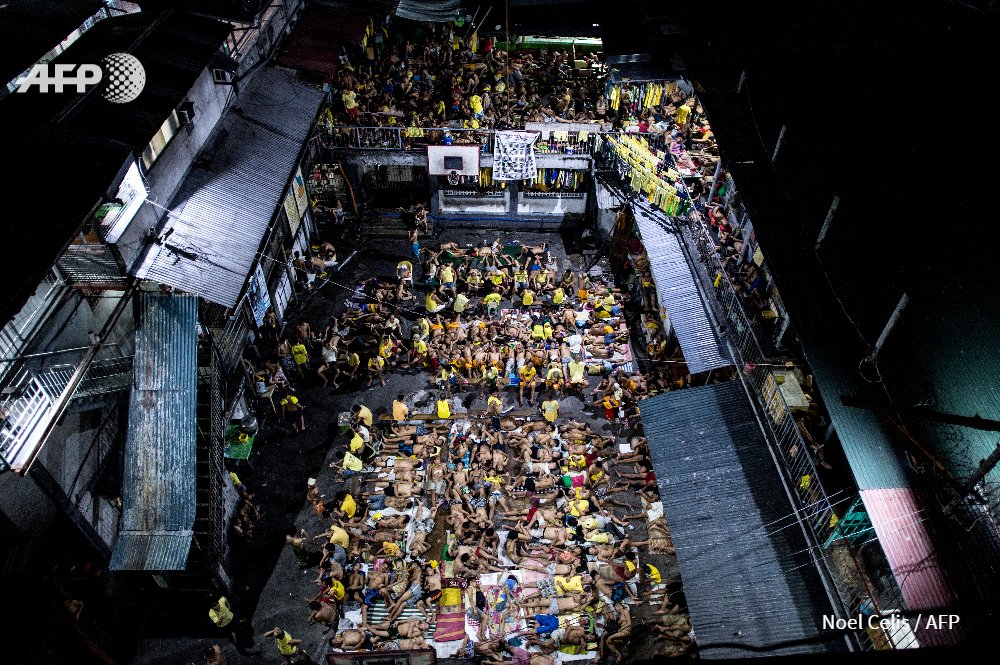
#Philippines 1/3 - The Quezon City jail in Manila #AFP Photo by @herime23: image via AFP Photo Department @AFPphoto, 30 July 2016
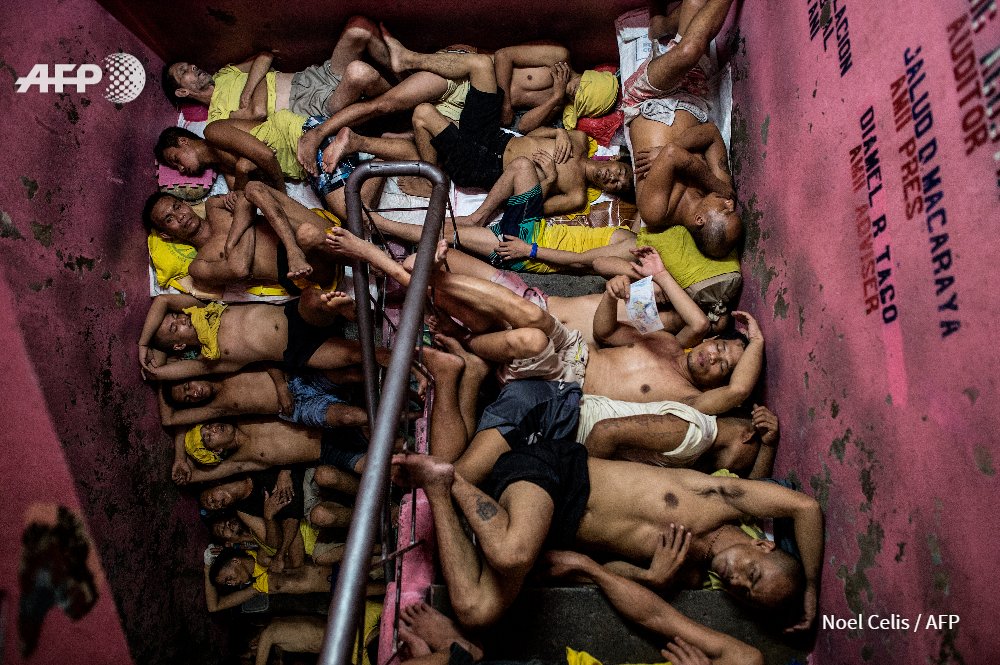
#Philippines 1/3 - The Quezon City jail in Manila #AFP Photo by @herime23: image via AFP Photo Department @AFPphoto, 30 July 2016
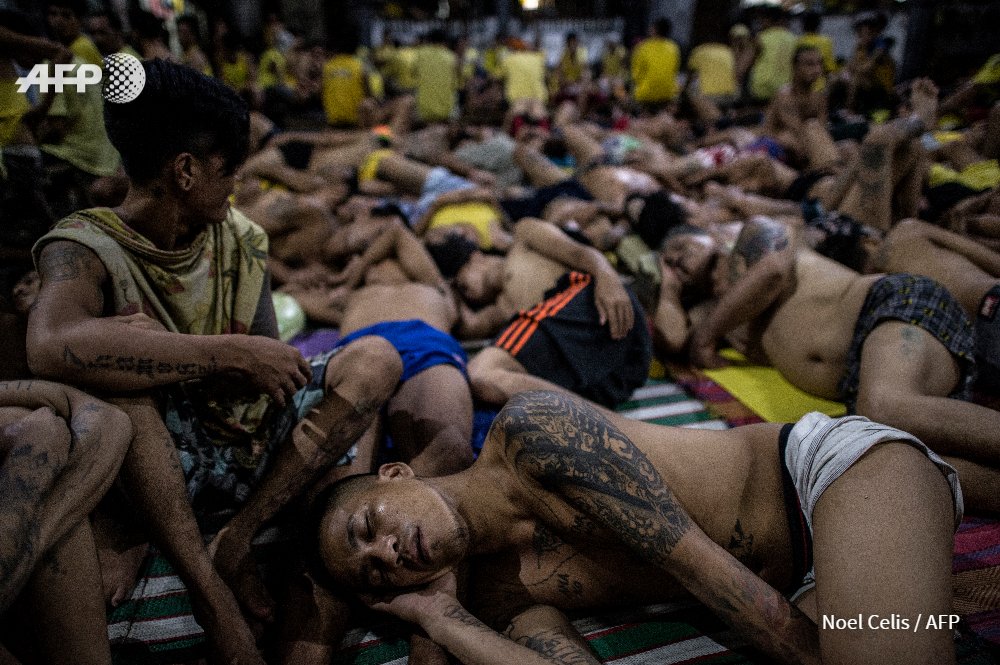
#Philippines 1/3 - The Quezon City jail in Manila #AFP Photo by @herime23: image via AFP Photo Department @AFPphoto, 30 July 2016
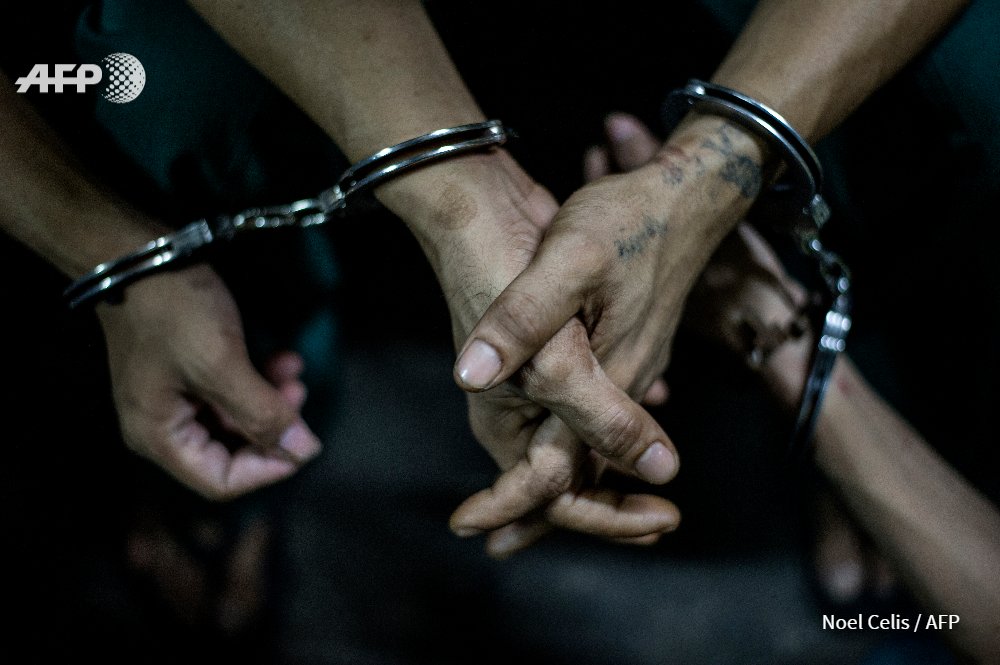
#Philippines 1/3 - The Quezon City jail in Manila #AFP Photo by @herime23: image via AFP Photo Department @AFPphoto, 30 July 2016
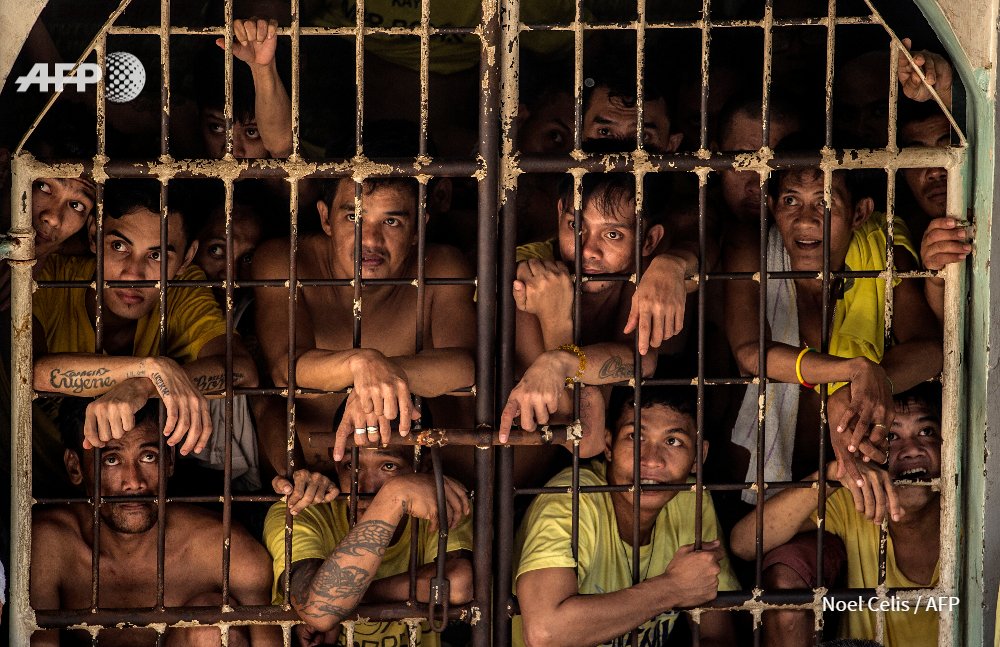
#Philippines 2/3 - The Quezon City jail in Manila #AFP Photo by @herime23: image via AFP Photo Department @AFPphoto, 30 July 2016
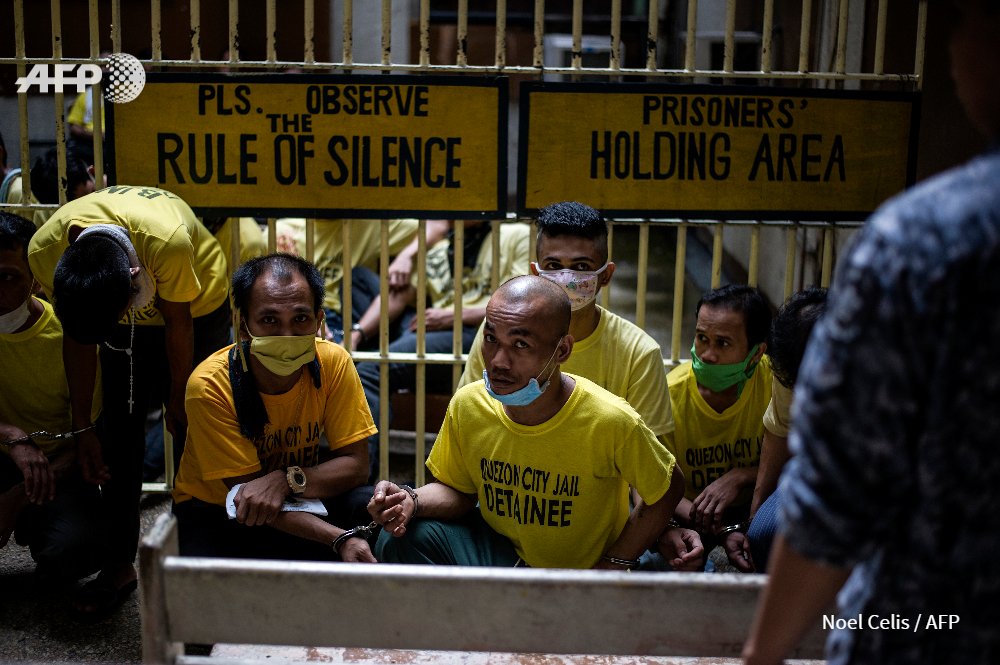
#Philippines 2/3 - The Quezon City jail in Manila #AFP Photo by @herime23: image via AFP Photo Department @AFPphoto, 30 July 2016
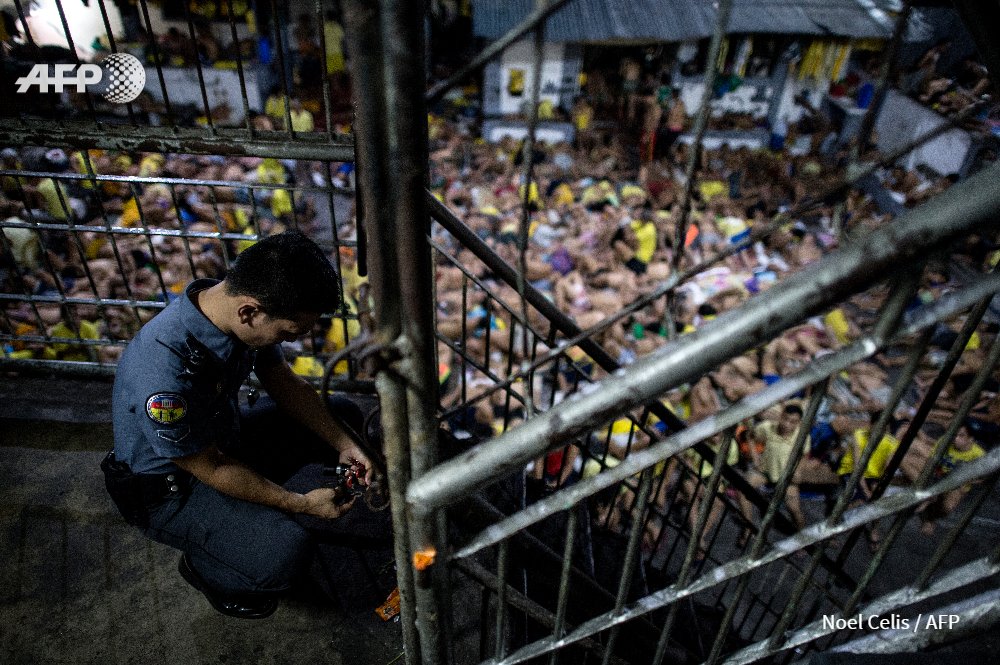
#Philippines 3/3 - The Quezon City jail in Manila #AFP Photo by @herime23: image via AFP Photo Department @AFPphoto, 30 July 2016
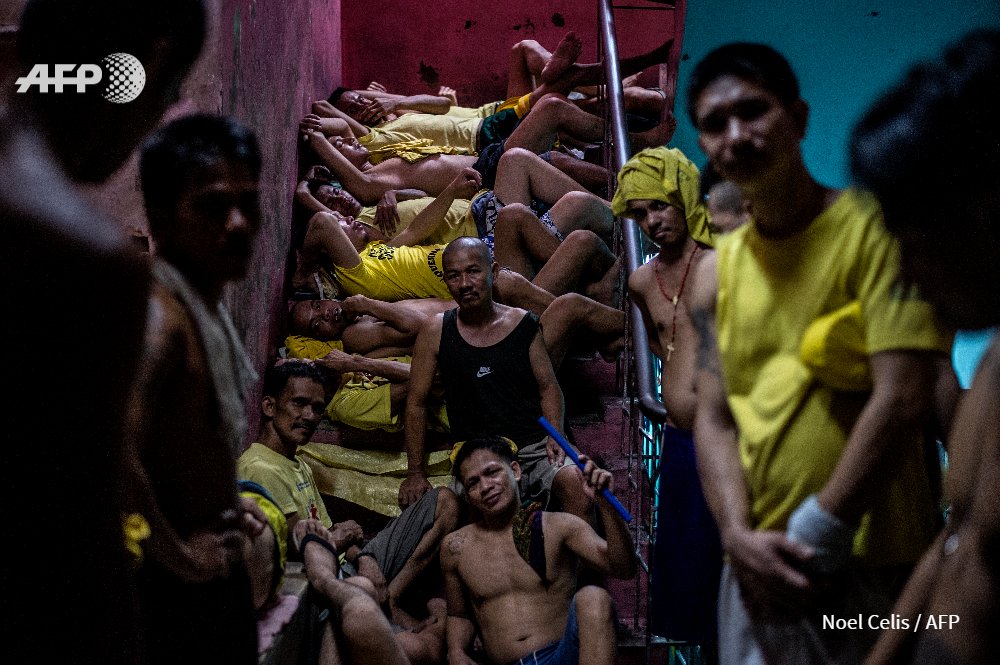
#Philippines 3/3 - The Quezon City jail in Manila #AFP Photo by @herime23: image via AFP Photo Department @AFPphoto, 30 July 2016
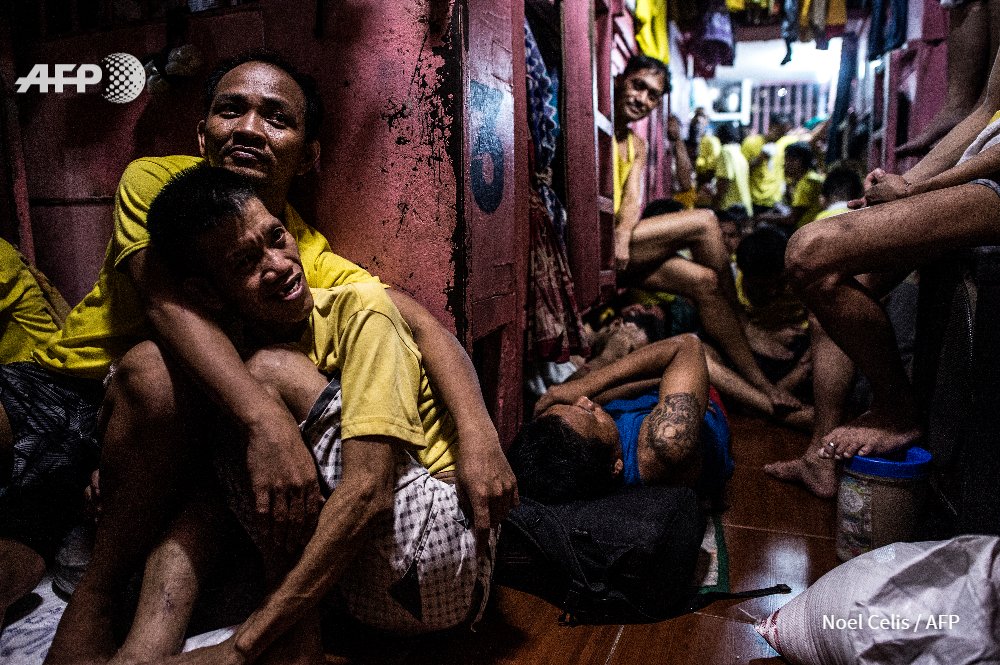
#Philippines 3/3 - The Quezon City jail in Manila #AFP Photo by @herime23: image via AFP Photo Department @AFPphoto, 30 July 2016
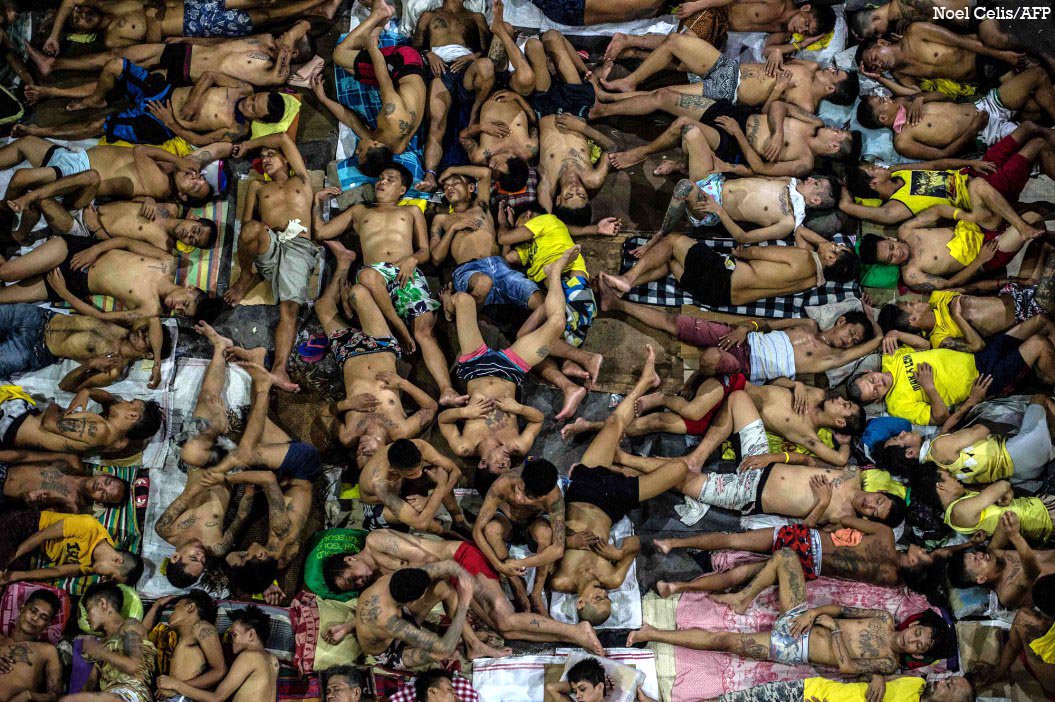
Astonishing images inside Manila's overcrowded Quezon City jail. Built for 800 housing 3,800 @herime23 @AFPphoto: image via SundayTimesPictures @STPictures, 30 July 2016
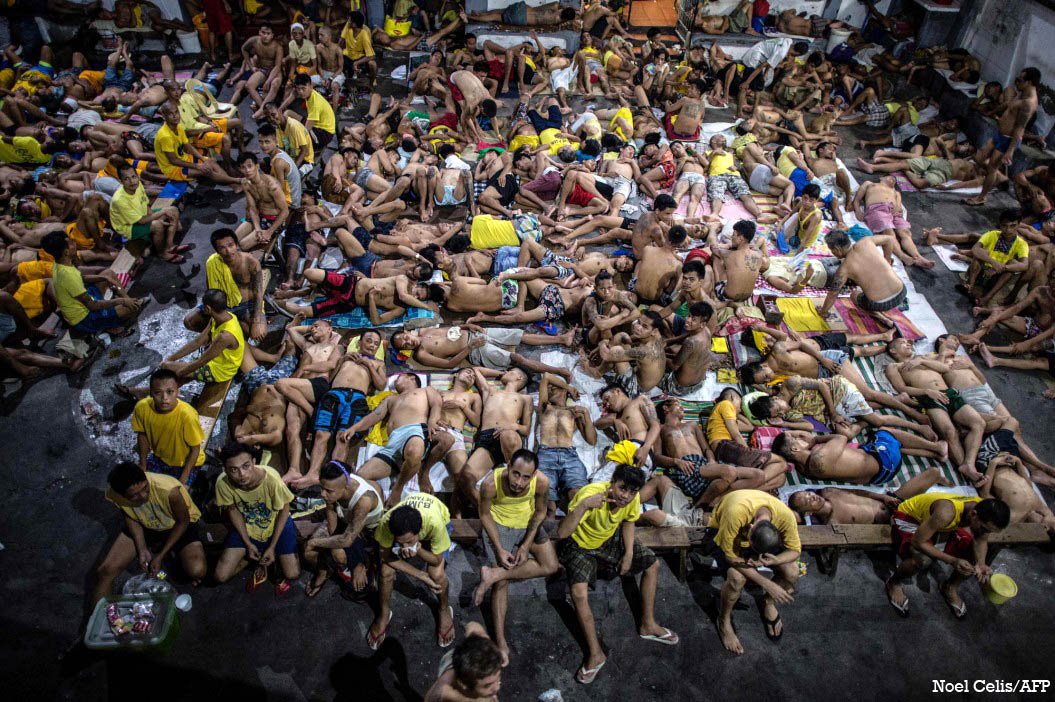
Astonishing images inside Manila's overcrowded Quezon City jail. Built for 800 housing 3,800 @herime23 @AFPphoto: image via SundayTimesPictures @STPictures, 30 July 2016
Girl touch models above giant reptile as part of a summer event during a rally in the world's biggest thought prison screaming No Mercy and I Want My Mommy

Girls touch models of Doraemon, a Japanese popular animation character, displayed at Tokyo’s Roppongi Hills as part of a summer event by Japan’s broadcasting company in Tokyo: photo by. Koji Sasahara / AP, 30 July 2016

People take a picture of Godzilla’s head at Shinjyuku Toho Building at Kabukicho district in Tokyo. The latest in the giant reptile Godzilla movies was released on Friday throughout Japan.: photo by Koji Sasahara / AP, 30 July 2016

Republican presidential candidate Donald Trump holds Kellen Campbell of Denver, right, and Evelyn Keane, of Castle Rock, Colorado, during a campaign rally in Colorado Springs: photo by Evan Vucci / AP, 30 July 2016

Democratic presidential candidate Hillary Clinton greets supporters as she arrives for a rally at McGonigle Hall at Temple University in Philadelphia: photo by Andrew Harnik / AP, 30 July 2016
killer dynasty
Hillary
Clinton wants to run for president as an economic populist, as a humane
progressive interested in bolstering the fortunes of poor and middle
class Americans. But before liberals enthusiastically sign up for Team
Hillary, they should remember this: In the late 1990s, Bill Clinton
played in instrumental role in creating the world’s largest prison
system -- one that has devastated our inner cities, made a mockery of
American idealism abroad, and continues to inflict needless suffering on
millions of people. And he did it with his wife’s support.
That
liberals are now being asked to get excited for Hillary’s Clinton’s
candidacy, announced on Sunday, almost requires the suspension of
disbelief. That the best progressive alternative to Clinton is a long-shot from Vermont is
a tragedy. This is not to say that President Hillary Clinton would
pursue the same prison policies as her husband -- the political headwinds
on criminal justice reform have shifted considerably in the past two
decades, and the Clintons, accordingly, have shifted with
them. But past actions should matter, and what they show is that the
Clinton Dynasty embraced and exacerbated one of the late 20th Century’s
greatest public policy disasters.
The explosion of the prison system under
Bill Clinton’s version of the “War on Drugs” is impossible to dispute.
The total prison population rose by 673,000 people under Clinton’s
tenure -- or by 235,000 more than it did under President Ronald Reagan,
according to a study by the Justice Policy Institute. “Under President
Bill Clinton, the number of prisoners under federal jurisdiction
doubled, and grew more than it did under the previous 12-years of
Republican rule, combined,” states the JPI report. The
federal incarceration rate in 1999, the last year of the Democrat’s
term, was 42 per 100,000 -- more than double the federal incarceration
rate at the end of President Reagan’s term (17 per 100,000), and 61
percent higher than at the end of President George Bush’s term (25 per
100,000), according to JPI.
Just
before the New Hampshire primary, Bill Clinton famously flew back to
Arkansas to personally oversee the execution of a mentally impaired
African-American inmate named
Ricky Ray Rector. The “New Democrat” spoke on the campaign trail of
being tougher on criminals than Republicans; and the symbolism of the
Rector execution was followed by a series of Clinton “tough on crime”
measures, including: a $30 billion crime bill that created dozens of new
federal capital crimes; new life-sentence rules for some three-time
offenders; mandatory minimums for crack and crack cocaine possession;
billions of dollars in funding for prisons; extra funding for states
that severely punished convicts; limited judges’ discretion in
determining criminal sentences; and so on. There is very strong evidence
that these policies had a small impact on actual crime rates, totally
out of proportion to their severity.
There is also very strong evidence that these policies contributed to the immiseration of vast numbers of black (and also white) Americans at the bottom of the economic ladder, according to the well-known conclusions of journalists, academics and other criminal justice experts. Federal funding for public housing fell by $17 billion (a 61 percent reduction) under Bill Clinton’s tenure; federal funding for corrections rose by $19 billion (an increase of 171 percent), according to Michelle Alexander’s seminal work, “The New Jim Crow: Mass Incarceration in the Age of Colorblindness.” The federal government’s new priorities redirected nearly $1 billion in state spending for higher education to prison construction. Clinton put a permanent eligibility ban for welfare or food stamps on anyone convicted of a felony drug offense (including marijuana possession). He prohibited drug felons from public housing. Any liberal arts grad with an HBO account can tell you the consequences for poor, black American cities like Baltimore. As Alexander writes, “More than any other president, [Clinton] created the current racial undercaste.”

Fans reach for a foul ball during a baseball game between the Atlanta Braves and the Philadelphia Phillies in Atlanta: photo by. John Bazemore / AP, 30 July 2016
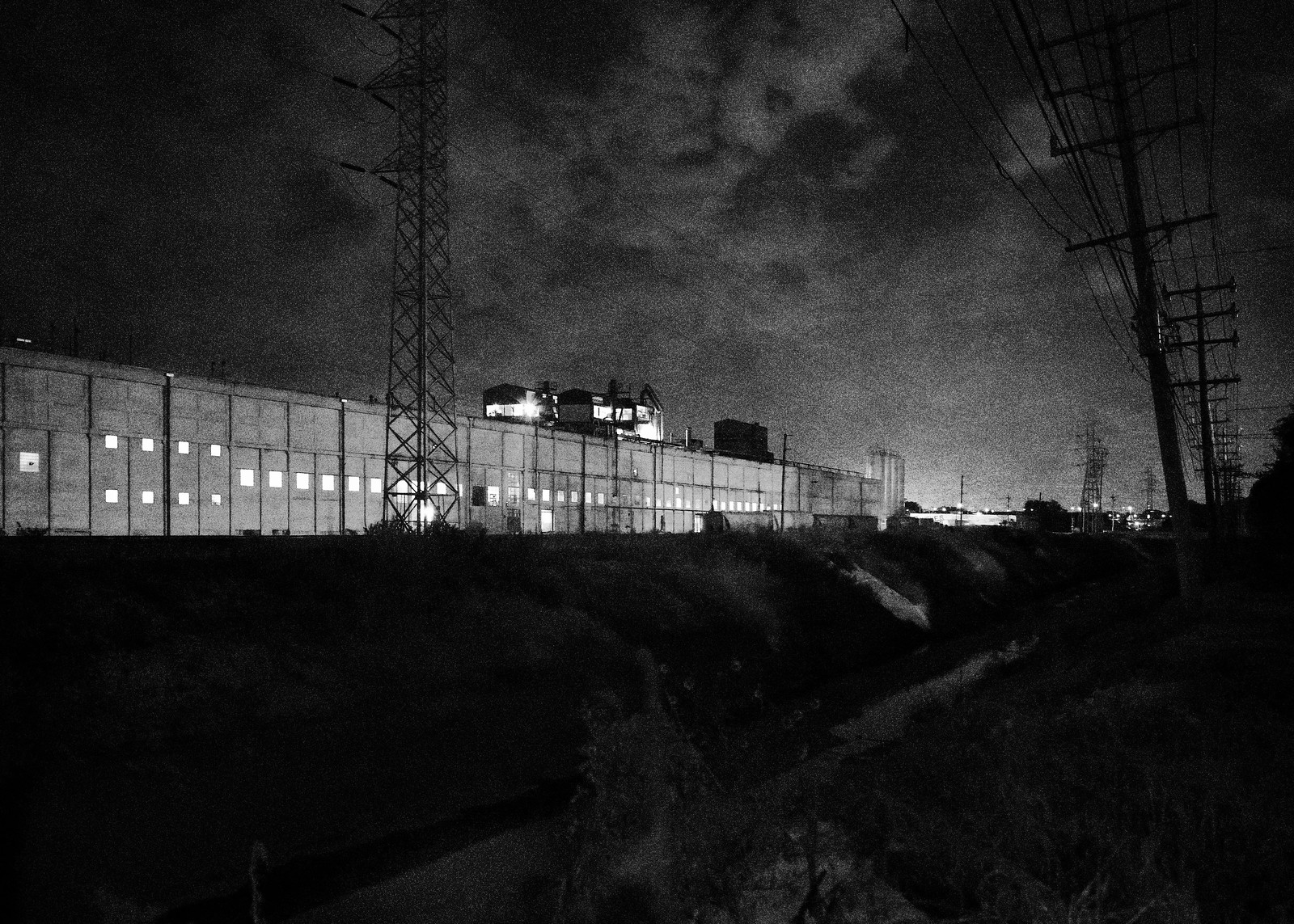
Factory, River des Peres, Dogtown (St. Louis): photo by chalkdog, 1 September 2013





No comments:
Post a Comment